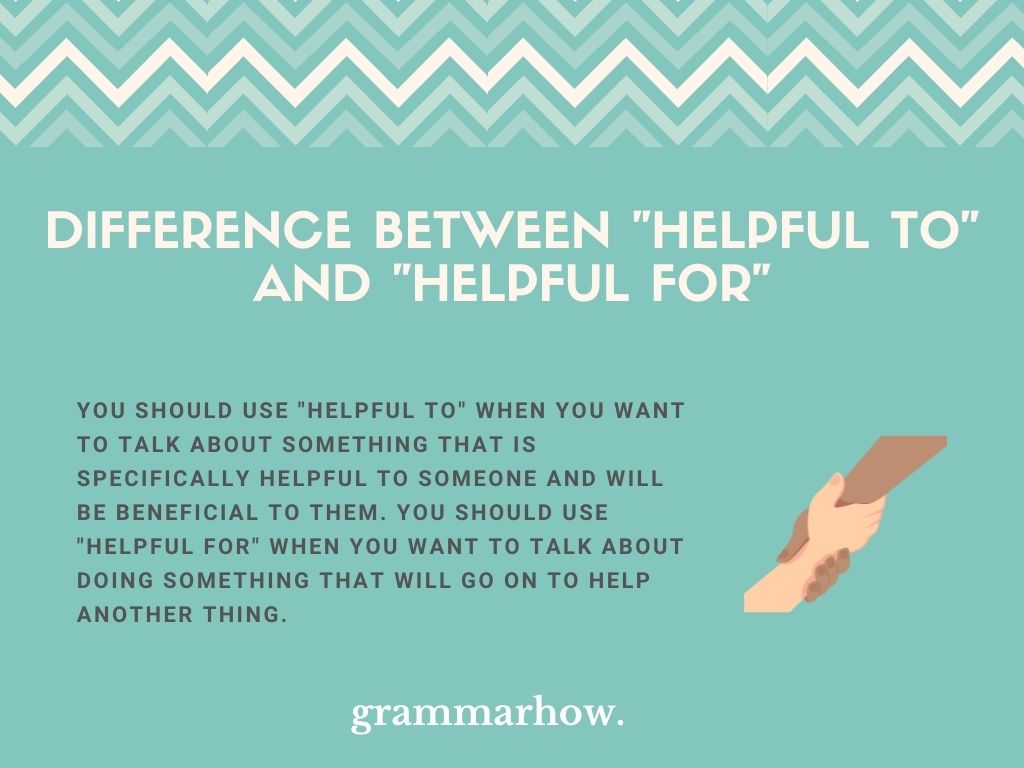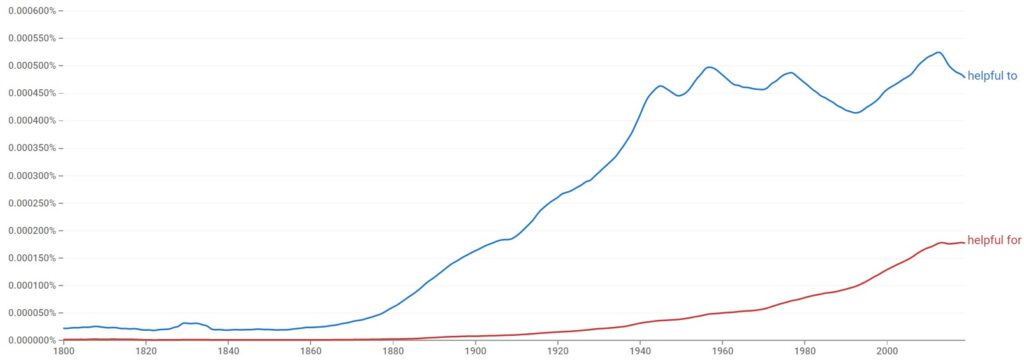Making sure we use the correct preposition after “helpful” can have an important impact on the overall meaning of our writing. This article will look at the differences between “helpful to” and “helpful for” and when you should use both.
What Is The Difference Between “Helpful To” And “Helpful For”?
You should use “helpful to” when you want to talk about something that is specifically helpful to someone and will be beneficial to them. You should use “helpful for” when you want to talk about doing something that will go on to help another thing.

To clarify the difference in meaning, it’s easiest to show you two examples:
- It’s helpful to bring books to class.
- Reading books is helpful for developing your own writing style.
As you can see, “helpful to” creates a simple clause that is helping somebody for some reason. “Helpful for” creates a way to improve on or do something else rather than directly impacting a person.
Is “Helpful To” Or “Helpful For” Used The Most?
When it comes to using phrases like this with minor differences, it might help to learn which is more common. That way, you can focus more of your learning on the most popular choice since most native speakers will be more likely to use it.
According to Google Ngram Viewer, “helpful to” is by far the most used choice over “helpful for.” Both phrases have grown in popularity over the last few decades, but “helpful to” is still, by and large, the most popular choice.

According to Google, “Helpful To” is mentioned 11,900 times on The New York Times website, while “Helpful For” is mentioned 3,400 times.
We can see from both sets of statistics that “helpful to” is the most appropriate choice. That’s because we’re often talking more about things that are “helpful to” someone or something rather than worrying about doing something to be “helpful for” a reason in the future.
Examples Of How To Use “Helpful To” In A Sentence
To help you understand the meaning of the two phrases, we’ll include some more examples. With these, you’ll have a much better idea of when “to” is the correct preposition.
- It would be helpful to me if you just went out and did the things I asked for.
- This will be helpful to her, and I think you should be the one to deliver it.
- I can’t find anything in this book that’s helpful to me!
- This isn’t helpful to children, and I suggest you rethink your approach.
- What is helpful to you might not be very helpful to the rest of them!
- This is very helpful to my children, and I think that they absolutely love your teaching methods!
- It would be helpful to bring a dictionary when you’re in my class, John.
“Helpful to” works well when we’re talking about something that directly benefits a person. We use it when we want to show what they might need to do to help themselves.
Examples Of How To Use “Helpful For” In A Sentence
“Helpful for” is less popular, but that doesn’t mean it isn’t used. We have plenty of good examples to share with you that’ll demonstrate when “helpful for” is the correct choice.
- It could be helpful for you to learn more about the happenings in history.
- Reading from these books is helpful for your revision techniques.
- Making sure you get a good night’s sleep is helpful for anyone looking to build their strength and fitness levels.
- Building character is helpful for anyone who worries that they’re not good enough to fit in.
- You should make sure that these things are helpful for the people who need them most; otherwise, they’re not much use to anyone.
- It would be helpful for others to see what you’re capable of if you’re willing to demonstrate.
- Making sure you speak at least one other language is helpful for your future.
“Helpful for” works when we’re talking about doing something that will be helpful for another thing (usually relating to something that we get benefit out of in the future).
Which Other Prepositions Can Be Used After “Helpful”?
There aren’t many good prepositions besides “for” and “to” that we can use with “Helpful.” The only other one that might make sense is “with,” which we’ll talk about now.
“Helpful with” is used when we’re talking about two or more people working together to try and help the other people in the group out.
- He’s not particularly helpful with his children and what they need.
- The discussion with my boss wasn’t helpful with me there, and I told him that.
Is It “Helpful To Me” Or “Helpful For Me”?
“Helpful to me” and “helpful for me” are both correct depending on the sentence you use. “Helpful to me” works when something specifically helps you. “Helpful for me” works when you do something that will help you later.
The same works if we replace “me” with any other pronoun. For example, the same rules apply when looking at “helpful to you” and “helpful for you.”
- It is helpful to me, and I appreciate you doing it.
- Coding is helpful for me to broaden my horizons. I’m hoping for a job in the industry soon.
- I hope this is helpful to you because it was incredibly helpful to me.
- It would be helpful for you to pay attention in class some more. That way, you won’t have to keep asking silly questions!
“Helpful To” And “Helpful For” – Synonyms
Finally, let’s look at some synonyms you might be able to use in place of both “helpful to” and “helpful for.” Any of these will be a great way to practice a new skill and expand your vocabulary a little.
- Beneficial to
- Beneficial for
- Useful to
- Useful for
- Convenient to
- Convenient for
- Important to
- Important for
- Productive to
- Productive for
All of these synonyms work well, but they also all require the prepositions “to” and “for” to be correct in the same way that “helpful” requires them.

Martin holds a Master’s degree in Finance and International Business. He has six years of experience in professional communication with clients, executives, and colleagues. Furthermore, he has teaching experience from Aarhus University. Martin has been featured as an expert in communication and teaching on Forbes and Shopify. Read more about Martin here.
